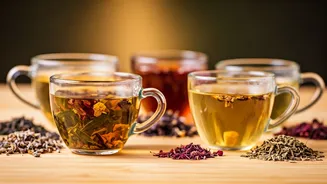Chamomile's Soothing Touch
Chamomile tea, known for its calming properties, isn't just for relaxation; it's a gentle ally for your skin and hair. Rich in antioxidants, chamomile
helps combat free radicals that can damage skin cells. Regular consumption can reduce inflammation, potentially alleviating conditions like eczema and rosacea. For your hair, chamomile tea can add shine and lighten it naturally. The antioxidants and anti-inflammatory compounds present in chamomile tea can soothe irritated scalps, contributing to overall hair health. Brew a cup, let it cool, and use it as a final rinse after shampooing for enhanced luster and a calmer scalp. Furthermore, chamomile's anti-inflammatory abilities can assist in reducing skin redness and irritation, leaving the skin feeling refreshed and calm. Incorporating chamomile tea into your beauty routine offers a holistic approach, benefiting both your inner peace and outer radiance.
Green Tea's Antioxidant Power
Green tea, a powerhouse of antioxidants, is a renowned beverage that offers a multitude of benefits for skin and hair. Packed with polyphenols, green tea combats oxidative stress and reduces the signs of aging. Regular intake can improve skin elasticity and promote a more youthful appearance. For hair, green tea can stimulate hair growth due to its ability to block DHT (dihydrotestosterone), a hormone linked to hair loss. Applying green tea to the scalp may also strengthen hair follicles, reducing breakage. Consider brewing green tea and letting it cool, then applying it directly to your scalp and hair. Allow it to sit for around 30 minutes before rinsing. This treatment can boost hair growth and overall hair health. The antioxidants in green tea also help protect skin from environmental damage, contributing to a healthier and more radiant complexion. Its consumption or topical application provides significant benefits for both skin and hair.
Hibiscus for Hair Growth
Hibiscus tea, often associated with vibrant blooms, is a lesser-known but powerful ally for hair growth and skin health. Rich in amino acids and antioxidants, hibiscus tea promotes keratin production, an essential protein for healthy hair. Regular consumption and topical application of hibiscus tea can stimulate hair growth and strengthen hair follicles, reducing hair loss and breakage. The natural acids in hibiscus can gently exfoliate the scalp, promoting a healthy environment for hair growth. For skin, hibiscus tea can provide a natural glow and aid in reducing blemishes. Using hibiscus tea as a hair rinse can add volume, shine, and manageability to the hair. Preparing a hibiscus hair mask by blending hibiscus flowers or petals with water and applying it to the scalp before washing is another effective method. Its properties contribute to a healthy scalp and promote the growth of thicker, fuller hair, making it a valuable addition to your beauty routine.
Rosehip's Skin-Loving Benefits
Rosehip tea, derived from the fruit of the rose plant, is packed with vitamin C and essential fatty acids, offering significant benefits for skin health. Vitamin C aids in collagen production, which helps improve skin elasticity and reduce the appearance of wrinkles. The antioxidants in rosehip tea protect the skin from environmental damage and promote a brighter complexion. The fatty acids nourish and hydrate the skin, contributing to a healthy glow. Consuming rosehip tea can also assist in reducing the appearance of scars and blemishes, as the tea’s properties promote skin regeneration. For those seeking skin hydration and a reduction in fine lines, rosehip tea can be a valuable addition to your daily routine. Applying rosehip oil extracted from the tea to the skin can further enhance its benefits, providing nourishment and promoting a radiant, healthy look. Embrace rosehip tea for its comprehensive approach to skin care, inside and out.
Peppermint for a Refresh
Peppermint tea, known for its invigorating aroma, provides several benefits for both skin and hair. Peppermint contains menthol, which has anti-inflammatory and antibacterial properties. When used in skincare, peppermint tea can help soothe irritated skin and reduce inflammation, making it beneficial for conditions like acne and eczema. For hair, peppermint can stimulate blood flow to the scalp, potentially promoting hair growth. Its cooling sensation can also relieve scalp irritation and dandruff. Using a peppermint tea rinse after shampooing can leave your hair feeling refreshed and invigorated. Furthermore, peppermint tea can help regulate oil production, benefiting those with oily skin or hair. Its ability to stimulate blood circulation also helps deliver nutrients to the scalp, thus boosting hair follicle health. For a quick refresh, brew peppermint tea and let it cool, and then apply it to the skin for a cooling sensation or use as a hair rinse for revitalized tresses.















